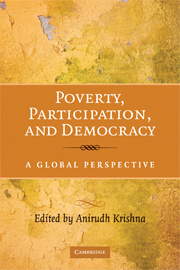Book contents
- Frontmatter
- Contents
- Preface
- Contributors
- Poverty, Participation, and Democracy
- 1 Introduction: Poor People and Democracy
- 2 Poor People and Democratic Citizenship in Africa
- 3 Do Poor People Care Less for Democracy? Testing Individual-Level Assumptions with Individual-Level Data from India
- 4 Inequality and Democracy in Latin America: Individual and Contextual Effects of Wealth on Political Participation
- 5 The Poor and the Viability of Democracy
- 6 Conclusion: Implications for Policy and Research
- Bibliography
- Index
2 - Poor People and Democratic Citizenship in Africa
Published online by Cambridge University Press: 14 May 2010
- Frontmatter
- Contents
- Preface
- Contributors
- Poverty, Participation, and Democracy
- 1 Introduction: Poor People and Democracy
- 2 Poor People and Democratic Citizenship in Africa
- 3 Do Poor People Care Less for Democracy? Testing Individual-Level Assumptions with Individual-Level Data from India
- 4 Inequality and Democracy in Latin America: Individual and Contextual Effects of Wealth on Political Participation
- 5 The Poor and the Viability of Democracy
- 6 Conclusion: Implications for Policy and Research
- Bibliography
- Index
Summary
If democracy consists of “rule by the people,” then the values, attitudes, and behaviors of ordinary folk are central to considerations of the fate of democracy. If it turns out that democratic stability in the medium- to long-term depends on the economic well-being of citizens, then democracies can be expected to be especially fragile in world regions where many people live in poverty.
This chapter explores the relationship of poor people to democratic citizenship in sub-Saharan Africa. It is prompted in part by intriguing research results emerging from South Asia that suggest that poor people are equally or more likely to hold democratic values, support democratic regimes, and vote in democratic elections. For example, Yadav finds for India in the 1990s “a participatory upsurge” among scheduled castes and tribes leading to “turnout of the lower orders of society…well above that of the most privileged groups” (2000: 120, 133). Bratton, Chu, and Lagos have replicated this result using National Election Survey data for India, confirming that Indians of lower material status were significantly more likely to cast a ballot in the 1999 election (2006).
To test these and related results in African contexts, data are drawn from the Afrobarometer. The Afrobarometer is a series of comparative national surveys that, among other things, measures the economic living conditions and political orientations of ordinary Africans. Each national survey – covering fifteen countries in Round 2 – is based on a probability sample representing the adult population eighteen years and older.
- Type
- Chapter
- Information
- Poverty, Participation, and DemocracyA Global Perspective, pp. 28 - 64Publisher: Cambridge University PressPrint publication year: 2008
- 17
- Cited by

